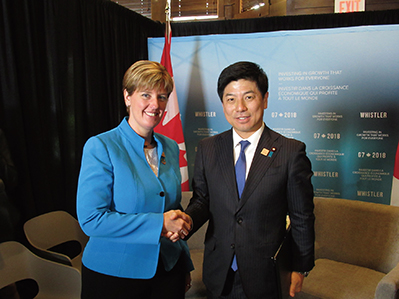(5) Partnership with other countries and international organizations
A. Partnership with other countries
Japan promotes coordination with other donors in each region and field. Japan also conducts high level dialogues on a wide range of development issues. In 2018, one such dialogue with the EU was held. It is becoming increasingly important to cooperate and collaborate with other donors to effectively utilize the ODA budget and address development issues by the international community as a whole.
Members of the Development Assistance Committee (DAC) of the Organisation for Economic Co-operation and Development (OECD), the so-called traditional donor countries, have been taking a leading role in carrying out development cooperation thus far. Nonetheless, emerging donor countries such as China, India, Saudi Arabia, Brazil, and Turkey have also started to provide assistance for developing countries, and to gain significant influence in recent years on the development issues. Japan, having experienced the transition from an aid recipient to a leading donor, has been striving to promote the effectiveness of development cooperation implemented by emerging donors to developing countries (South-South cooperation), by providing assistance to emerging countries, in collaboration with other countries including emerging countries, particularly by means of Triangular Cooperation.
B. Partnership for the G7 development issues

State Minister for Foreign Affairs Nakane (at the time) shaking hands with the Minister for International Development Marie-Claude Bibeau of Canada (Chairman) at the G7 Development Ministers Meeting held in Whistler, Canada
From May 31, 2018 to June 2, 2018, the G7 Development Ministers Meeting was held in Whistler, Canada for the first time in eight years. Representing Japan, then State Minister for Foreign Affairs Nakane attended the meeting. At the meeting, discussions were held on a range of development topics with a focus on gender, and in addition to the Meeting Chair’s Summary, (1) the Whistler Declaration on Unlocking the Power of Adolescent Girls for Sustainable Development, (2) the Whistler Declaration on Gender Equality and the Empowerment of Women and Girls in Humanitarian Action, (3) the Whistler Declaration on Protection from Sexual Exploitation and Abuse in International Assistance, and (4) the Whistler Principles to Accelerate Innovation for Development Impact were also issued.
C. Partnership with International Organizations
Amidst the growing need in recent years for the international community to make unified efforts to address global issues, such as poverty, climate change, disaster risk reduction, and health issues, Japan is cooperating with international organizations.
The OECD-DAC is working for development cooperation aligned to the current era, including the “2030 Agenda,” through strengthening cooperation with various actors such as emerging countries and the private sector. Specifically, discussions are underway on the revision of measurement methods for the proper assessment of each country’s ODA disbursements, approaches to utilize ODA for mobilization of development funds from the private sector, and approaches to statistically capture a wide range of non-ODA development finance, including private sector investment and financing from emerging donor countries.
In 2016, Japan returned to the OECD Development Centre, which is a think tank of the OECD that conducts surveys and research regarding the development issues of developing countries. Not only OECD member states, but also emerging countries and developing countries that are not members of the OECD participate in the Centre. It plays an important role as a forum for policy dialogue on development in a variety of regions. In April 2018, Japan jointly organized the “Seminar on Promoting Quality Infrastructure” with the Centre, and will continue to cooperate closely and fulfill its role in strengthening the Centre’s relationship with Asia. This Seminar presented Japan’s voluntary contributions to the Centre to promote the concept of “Quality Infrastructure,” and also introduced each activity for Quality Infrastructure to relevant countries and organizations. As a result, the importance of building infrastructure with a focus not only on quantity, but also on quality, was recognized among the participants.
Japan contributes to discussions related to improving effectiveness of development cooperation through multi-stakeholder partnerships in the international arena, particularly within the context of the Global Partnership for Effective Development Co-operation (GPEDC), an international forum established at the 2011 Busan High Level Forum on Aid Effectiveness. At the Second High-Level Meeting of GPEDC in 2016, Japan also contributed to discussions by leveraging examples from its own achievements in development cooperation to widely present the effectiveness of triangular cooperation as one effective and inclusive collaborating tool to achieve the SDGs.
